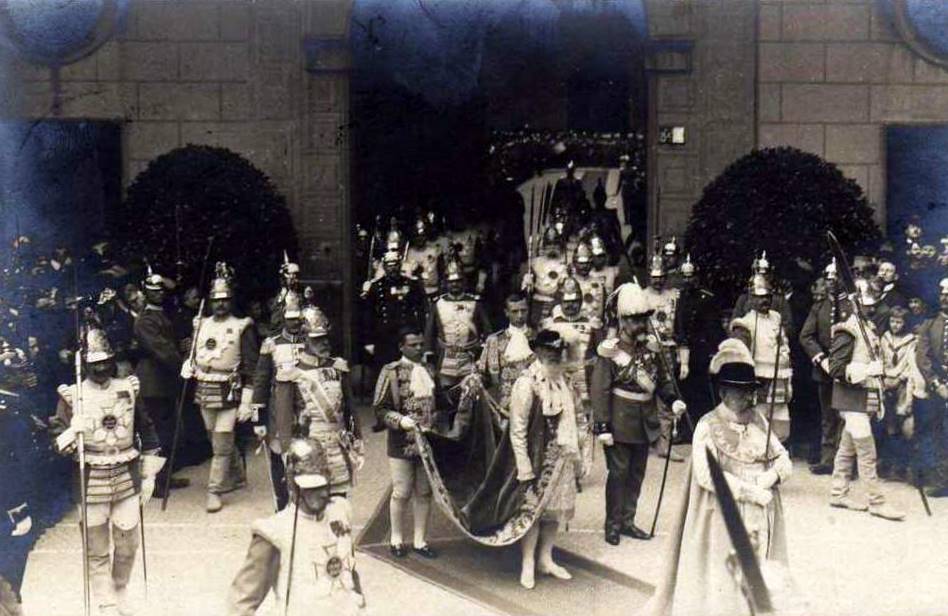
World War I (1914-1918) and the first following years changed the world in numerous ways. One of the most remarkable ones was the fall of German monarchies and creation of the republic. But whenever such transformations happen, there are always some who oppose them.
The dissolution of Kingdom of Bavaria
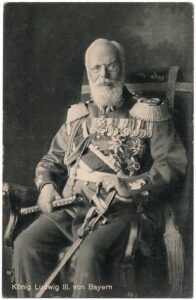
On 8th of November 1918 the People’s State of Bavaria was proclaimed. Soon the entire German Empire collapsed and the Weimar Republic arose from the ashes of the Great War.
In the meantime, in northern Germany communists from the Spartacus League started their own revolt, opposed both to monarchism and the new liberal republic.
The first notable action of the conservative Bavarians who didn’t approve of all these events was carried out on 21st of February 1919. In Munich, former aristocrat Anton Graf von Arco auf Valley assassinated Kurt Eisner, the pacifist and radical social democratic politician with Jewish ancestry. Eisner was the first republican prime minister of Bavaria and the charismatic leader of the anti-monarchist revolution carried out during previous November.
The assassination made young man famous and for many people he became a hero. He was a source of inspiration for Joseph Goebbels, future “minister of propaganda” in the Third Reich. However, the action made everyone in the city even more radical and on 6th of April the Bavarian Soviet Republic was proclaimed. Less than a month later, on 3rd of May, regular soldiers from northern Germany and paramilitary anti-communist units known as Freikorps entered Munich and ended the revolutionary rule in the region.
First years in the Weimar Republic
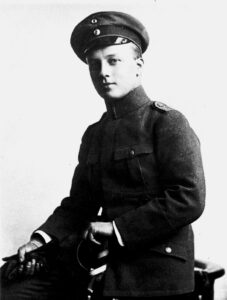
Monarchism had a completely different position in Bavaria. Numerous people there never accepted the collapse of their kingdom and wanted monarchy back.
In the interwar there was a party known as The Centre. It represented the interests and views of the Catholic Church. But it was not enough for the Bavarians. Already in 1918, the local politicians of this party left it and created their own organisation – Bavarian People’s Party. Apart from its even more conservative and catholic views, its members supported the restoration of monarchy and Bavarian power within Germany. BPP quickly became the strongest party in the region.
In 1919-1923, more and more Bavarians began turning increasingly against the central government in Berlin. Unlike protestant Prussia, they were Catholics. In the north, the Social Democratic Party of Germany became the strongest and the ruling force, whereas in Bavaria this force was despised and the most supported group was Bavarian People’s Party. Bavarians feared direct rule from Berlin as they started to feel more and more different than the rest of Germans. The Bavarian local government acted as it wanted, ignoring what the capital city thought.
In 1923 hyperinflation hit Germany. Additionally, the pride of the country which less than a decade ago was a proud empire was terribly shaken by the occupation of some of the German territories by the Allied troops. Due to separatist ideas, Bavaria was even more unstable than the rest of Germany.
Attempt of coup d’état

This situation seemed to be a good opportunity for three men: Gustav von Kahr, Hans von Seißer and Otto von Lossow. The first one was a politician closely related to the Bavarian People’s Party and former Bavarian Chancellor. In 1923 he received the title of State Commissioner and became a de facto dictator. The second one was head of Bavarian police and the third – head of Bavarian army.
All three were monarchists and enemies of the federal government. Together they formed a triumvirate ruling over Bavaria. But their ambitions were higher – von Kahr dreamed about taking over the entire Germany and restoration of the German Empire or at least creating an independent Kingdom of Bavaria, free from SPD sitting in Berlin. Soon, after the right orders, Bavarian units of the Reichswehr (German army) had to swear an oath of loyalty to the Bavarian government, not the German government.
On 8th of November Triumvirate organised a meeting with Bavarian citizens and nationalist organisations in Bürgerbräukeller – a well known beer hall in Munich. There was a place for 2000 people inside, von Kahr’s group announced that the topic of the meeting will be the future programme of his government.
The date was probably well chosen – 8th of November was also the day when Emperor Wilhelm II was forced to abdicate in 1918. Some suspected that they wanted to proclaim the independence of Bavaria and ask the Crown Prince Rupprecht Wittelsbach – the then pretendent to the Bavarian throne – to become a king. We will never know that, however.
Impact of Hitler’s putsch
The republic was saved by…. Adolf Hitler. In parallel with von Kahr, von Lossow and von Seisser, the leader of NSDAP had been planning his own putsch and knew that he had to act before the monarchists would do it. Hitler was among those who thought that the plans of von Kahr’s group was to secede and restore the royal rule. His ideas of a strong and united Reich didn’t match with the independent, catholic and quite liberal Kingdom of Bavaria. He and his SA troops intervened in the meeting and started the well known Beer Hall Putsch.
All three Triumvirate members were imprisoned and forced to pledge allegiance to the new German chancellor. Then they were released, but had to promise that they will remain loyal to NSDAP. It was the great mistake of the NSDAP plotters: At night all three monarchists mobilised their loyalist troops and they were the ones who defeated Hitler in his first trial to become the German ruler.
In 1924, Anton Graf von Arco auf Valley had to move from his cell 70 in the Landsberg Prison to somewhere else, until he was finally released in 1925. It was necessary, because the new person arrived at the prison. The next prisoner who moved into cell 70 was the future Führer of Germany.
Moderate course
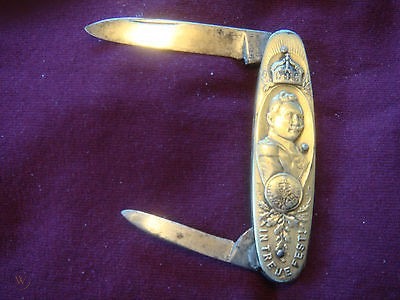
After 1924 the situation in Germany stabilised and the BPP took a more moderate stance. Years 1924-1929 are known as Goldener Zwanzigen (Golden Twenties). Still, the conservative catholics remained the strongest party in Bavaria. In 1925 they even presented their own candidate in German presidential elections – Heinrich Held.
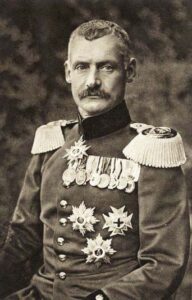
In the early 30s everyone could observe the rise of popularity of the National Socialists. Many monarchists were among the people who feared their dictatorship and tried to prevent it somehow. Bavarian Social Democrats and Bavarian People’s Party agreed that restoration of the monarchy could save Bavarian people from the rule of Adolf Hitler. They thought about creating a General State Commissioner title for the Crown Prince Rupprecht. There were numerous problems which prevented it.
Firstly, Bavarian Chancellor Heinrich Held didn’t find support from president Paul von Hindenburg and the German army. Despite being a monarchist, as a member of a former Prussian nobility called Junkers, Hindenburg cared only about the restoration of the rule of the House of Hohenzollern and wasn’t interested in crowning someone from the other, distant German state.
Secondly, most Bavarian monarchists wanted the king, not a General State Commissioner. To achieve it, the change in the constitution was necessary, which wasn’t so simple. Finally, the German Chancellor Adolf Hitler took his own steps and warned Held that restoration of monarchy would lead to a “terrible catastrophe”.
1932 was the year of the last democratic elections in interwar Bavaria. Like all others, they were won by the Bavarian People’s Party, but this time by a scratch. They gained 32.6 %, whereas NSDAP gained 32.5%.
Dissolution of monarchist movement
In 1933 the Third Reich was created and NSDAP gained total power in Germany. Monarchists were among the enemies of the new regime. The Bavarian People’s Party and other monarchist organisations were forcibly dissolved and banned. Gustav von Kahr was murdered during Night of the Long Knives in 1934. Hitler himself was a republican and knew that most monarchists wanted a different Germany than he did. Many monarchist activists were imprisoned or put in concentration camps. Adolf Freiherr von Harnier was killed there.
Crown Prince Rupprecht avoided this fate, because when the Gestapo arrested his family, he was staying in Italy. His closest relatives – which would have been the members of the royal family of Bavaria if Bavaria had been a kingdom – were sent to concentration camps. Anton Graf von Arco auf Valley supported a federalist concept of Germany so initially he was held in “protective custody”, but soon released after promising to do no harm to Hitler.
Bartłomiej Dmowski, DP1